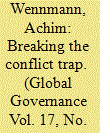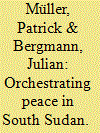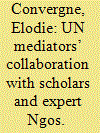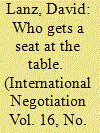| Srl | Item |
| 1 |
ID:
104445


|
|
|
| 2 |
ID:
171713


|
|
|
|
|
| Summary/Abstract |
Previous research has primarily focused on the EU’s high-profile involvement as direct mediator in peace negotiations. Conversely, less attention has been devoted to the EU’s support to third parties’ mediation efforts, which is a significant component of its mediation activities. Addressing this research gap, this article develops a conceptual framework for the systematic analysis of EU mediation support, identifying key mediation support techniques and the conditions for their success. In terms of mediation support techniques, the EU may rely on “endorsement”, “coordination”, “assistance”, and “lending leverage” to empower and steer third party mediators in line with its mediation objectives and values. We illustrate the utility of the conceptual framework for the EU’s support to IGAD in mediating in South Sudan’s civil war. We find that the EU has contributed significantly to IGAD’s empowerment in terms of endorsement, coordination, assistance, and lending leverage. Simultaneously, our analysis also points to important challenges in the EU-IGAD relationship, which relate to challenges concerning strategic engagement with IGAD’s internal politics that are marked by diverging interests and ties of its member states to the conflict parties.
|
|
|
|
|
|
|
|
|
|
|
|
|
|
|
|
| 3 |
ID:
143903


|
|
|
|
|
| Summary/Abstract |
UN mediators work more and more closely with academics and expertise-based non-governmental organizations, in particular through the Mediation Support Unit. The Organization appears to genuinely rely on them to conduct mediation and to strengthen its capacity in the area, to the point where it is sometimes difficult to operate a clear distinction between the two types of actors. This article analyzes why the practice of mediation today creates a demand for such expertise-focused cooperation. Beyond the need for flexibility and additional resources, the explanation lies in the prevailing feeling of uncertainty caused by today’s internal conflicts, for which the traditional state-centric lens is becoming irrelevant. In this context, the UN relies on knowledge produced by an epistemic community of peace and conflict scholars, and is embedded in a network of nongovernmental mediators with which it exchanges know-how, following the logic of communities of practice.
|
|
|
|
|
|
|
|
|
|
|
|
|
|
|
|
| 4 |
ID:
105187


|
|
|
|
|
| Publication |
2011.
|
| Summary/Abstract |
Who gets a seat at the table and who does not is an important consideration for successful peacemaking. However, current research does not provide sufficient guidance for understanding the politics of participation in peace negotiations. This article develops a conceptual framework for understanding these dynamics. Its central theme is that the inclusion or exclusion of a given actor in peace negotiations is affected by two independent factors. One factor pertains to the practical requirements of the peace process and addresses the following question: does the participation of a given actor augment the chance of reaching a sustainable peace settlement? The other factor relates to the normative dimension of peace talks: is the participation of a given actor consistent with the values of international mediators and sponsors of peace negotiations? The article argues that the dynamics of inclusion and exclusion result from the interplay of these two factors. The most straightforward situation for mediators is when practical requirements and international norms are mutually reinforcing. Difficulties arise from scenarios where practical effectiveness and norms contradict each other. This is the case when the involvement of a given person (or group) is imperative in terms of the peace process, but difficult to justify politically because this person has committed terrorist acts or is indicted by an international court.
|
|
|
|
|
|
|
|
|
|
|
|
|
|
|
|